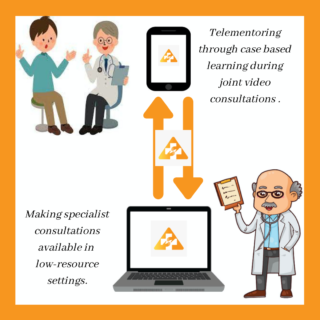A case-based mentorship platform to strengthen the Indian Healthcare system
After analyzing the current state of healthcare in India, it is evident that the government has taken several steps to improve the overall health system in the country. Successfully dealing with the pandemic and completing the vaccination drive throughout India is a matter of pride for such a large country. However, India still has a long way to go to achieve global benchmarks in healthcare, especially when it comes to speciality medical care.
The concentration of specialists and healthcare personnel in and around large cities is a significant obstacle to providing healthcare to 70% of the Indian population living in rural areas. The Rural Health Survey 2020-21 report highlights a significant shortfall of specialists at Community Health Centers (CHCs), with just 4,405 specialists serving in rural CHCs compared to the required 21,924. The report also indicates a shortfall of 83.2% of surgeons, 74.2% of obstetricians & gynaecologists, 82.2% of physicians, and 80.6% of paediatricians.
While India has an adequate supply of primary doctors (General practitioners), this cadre has been expanded to include Ayush doctors. However, this still leaves a gap in specialized medical practitioners in rural areas, forcing patients needing care beyond primary care to travel to distant district centres. Although the number of medical colleges in India has increased, leading to better availability of MBBS doctors in rural areas, a large majority of those with Post-Graduate (MS, MD) degrees still hesitate to serve in the peripheral government facilities due to inadequate support and resource infrastructure.
The lack of specialist doctors in CHCs forces patients to travel to district hospitals, depriving them of basic specialist care closer to their homes. This practice places an additional burden on specialists in district health centres, making it counter-productive for providing appropriate care. Patients often face higher travel and logistic expenses, along with loss of wages due to travel time, leading to delays in seeking treatment and further compromising their healthcare.
Creating adequate clinical material, providing quality infrastructure and adequate support staff for medical specialists stationed in peripheral centres appears to be a never-ending challenge. Despite the advancements in medical science, there are still wide gaps between these capabilities and the majority of the Indian population who require them. There is a need for a bridging mechanism to ensure that patients seeking speciality healthcare do not have to travel to district health centres or major cities unless necessary. Additionally, general practitioners in rural areas need a mechanism to upgrade their skills beyond a certain point, preventing their practice from becoming monotonous and routine.
To bridge this gap between rural and urban healthcare, an active mechanism providing real-time connectivity between general practitioners in rural areas and speciality care doctors in cities is required. Such a mechanism would help the rural population access the best of the best speciality doctors while upskilling the general practitioners. If implemented successfully, it would help decongest district health centres and big private hospitals in cities. Patients could access the best of the best speciality doctors through remote consultation before travelling for surgery or extended treatment, reducing travel time and expenditure.
The advent, penetration, and easy accessibility of internet services in India have paved the path for such connectivity and must be exploited to bring about the much-awaited healthcare revolution. Innovative and constructive workable solutions like the PyraMed app have been launched to fill the

gap between rural primary doctors and specialists in larger cities. This unique platform allows senior specialists to provide case-based mentorship to primary doctors so that they can treat their patients on a wider scale. The obligatory inclusion of primary doctors in the teleconsultation process significantly enhances the quality of a teleconsultation and maintains the sanctity of the health pyramid. This reduces the chances of miscommunication, misinterpretation, mistreatment, or any possible side effects. By making healthcare more inclusive of technology, India can eradicate the bottlenecks we face in providing quality treatment to our population.


